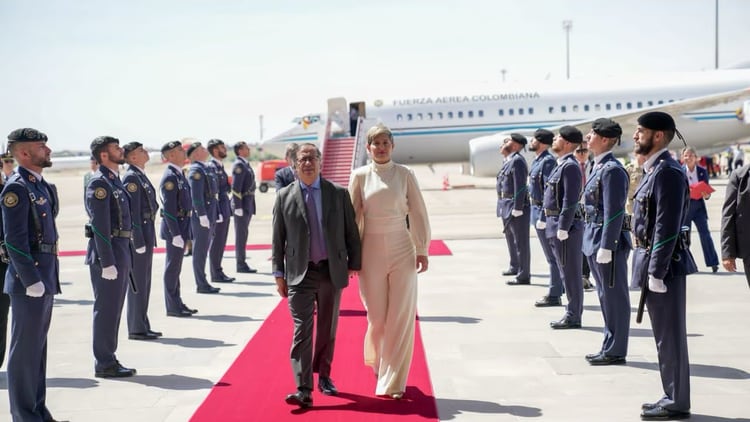The Diplomat
The President of Colombia, Gustavo Petro, arrived in Madrid at midday yesterday, where he will begin a state visit to Spain today, which will be extended with a trip to Salamanca on Friday, the 5th.
Yesterday afternoon, at the Colombian Ambassador’s residence, Petro held a reception for representatives of the Colombian community, inaugurated the Cultural Centre named after the Nobel Literature Prize winner Gabriel García Márquez, and visited the sixth edition of the Services Fair, an exhibition of Colombian entrepreneurs with whom he held a meeting.
Petro’s arrival in Madrid was preceded by a speech he gave on Monday in Bogotá from the balcony of the Palacio de Nariño, addressed to hundreds of supporters celebrating May Day, to whom he said that the Colombian people fought to “free themselves from the Spanish yoke, to dethrone kings and dukes and princes, to end privileges, to end a productive regime of slave owners who condemned black men to be slaves in perpetuity (…) The liberating army was the first to fight for the liberation of Colombia, and the first to fight for the liberation of the country. …) The liberating army was more powerful than the army of the yoke”.
Today, the President of Colombia, together with his wife, Verónica Alcócer, will be officially received by Their Majesties the King and Queen of Spain at the Royal Palace and will then go to the Congress of Deputies, where he will address the deputies and senators gathered in joint session.
After making a wreath at the monument to those who gave their lives for Spain, in the Plaza de la Lealtad, he will go to the Zarzuela Palace to talk with Don Felipe, and later to Madrid City Hall, where he will be presented with the Golden Key of the city.
In the evening, the King and Queen will host a gala dinner for the Colombian leader and his wife, which will take place at the Royal Palace and will be attended by the President of the Government, Pedro Sánchez, and other members of his cabinet, as well as State authorities and representatives of political parties, the economy and civil society.
Tomorrow, Thursday, Petro is scheduled to inaugurate a business forum at the headquarters of CEOE, and then he will travel to La Moncloa Palace to meet and have lunch with Pedro Sánchez, and to preside, together with him, over the signing of several agreements between Spain and Colombia. In the evening, he will host a reception at the Palace of El Pardo, in honour of the King and Queen of Spain.
On Friday, the 5th, Petro will take part in the New Economy Forum and will travel to Salamanca, where he will receive the Medal of the University of Salamanca, where he studied.
Among the objectives of Gustavo Petro’s visit to Spain is the desire to boost bilateral economic relations, which, although they are intense, the Colombian leader believes that they could increase.
Spain maintains a strategic partnership with Colombia and is the second largest investment partner after the United States. Government sources stress that there is agreement on many issues, such as the green and digital transition and the need for reindustrialisation, something that was already evident in Sánchez’s visit to Bogotá last August, weeks after Petro took office.
Now, according to Moncloa, the Government’s intention is to continue strengthening economic and trade relations, particularly in areas such as connectivity and railways, in which Colombia is interested in making progress and in which Spain can contribute experience. Moncloa also emphasises the significant business presence in Colombia, as well as the desire of Spanish companies to remain in the country, and highlights Colombia’s interest in strengthening these ties.
In this sense, Colombian diplomatic sources explain that Petro is particularly interested in attracting private investment for the energy transition towards cleaner sources that he wants to undertake in the country and believes that Spain, due to its leadership in this field, could help the country to move towards an energy model that moves away from hydrocarbons.
Colombia also believes that Spanish companies could participate in the infrastructure development plan that the country is going to undertake, while it is also looking for ways to promote itself as a destination for sustainable tourism among Spaniards and Europeans through strategic alliances and agreements.
Migratory issues are also on the agenda, since both Colombia and Spain are receiving countries. Both countries share an interest in guaranteeing legal and safe channels for migration, which is why both plan to participate in the US programme to set up regional centres to process migrants and refugees for transfer to other countries, including Spain.
The talks at Moncloa are also expected to discuss the fight against climate change, energy transition and digital transformation, as well as the six-month Spanish Presidency of the EU, during which the Spanish government wants to reactivate relations between European partners and Latin America and the Caribbean.
In addition, Pedro Sánchez will reiterate to Petro that he can count on Spain to support the dialogue that he has undertaken with the guerrillas of the National Liberation Army (ELN), a dialogue that reached its third round yesterday in Havana, and in which our country appears as an “accompanier” of the process.
On the other hand, it is also foreseeable that there will be talk of another ongoing dialogue, that of Venezuela, after Petro convened an international conference in Bogotá last week with the intention of unblocking the talks between the regime of Nicolás Maduro and the opposition, suspended since November, and that the opposition leader Juan Guaidó, who fled to Colombia, was forced to leave the country for the United States.





